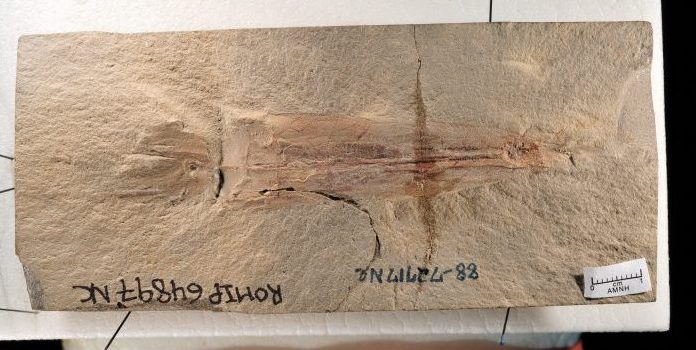(Jacob Bruns, Headline USA) Sleepy Joe Biden is so ancient that paleontologists have named a prehistoric fossil after him, according to a March 8 press release from the American Museum of Natural History.
The fossil of a 10-armed “vampire” squid is apparently 330 million years old, said Christopher Whalen, a Yale University researcher who recently published an article about the discovery in the journal Nature Communications.
“It is not inconceivable that it might have used its sucker–laden arms to pry small ammonoids out of their shells or ventured more inshore to prey on brachiopods, bivalves, or other shelled marine animals,” said Whalen, who also works at the natural history museum.
By his report, the species is 82 million years older than any other yet discovered in its group.
“It is the first and only known vampyropod to possess 10 functional appendages,” he said.
Whalen did not actually find the fossil himself—it was unearthed in Montana in 1988. He simply looked at it under a microscope after it had been largely ignored since its discovery.
But much like its new namesake—who undertook his first failed presidential run in 1988—the fossil’s persistence and tenacity have finally paid off.
Some might consider the comparison with Syllipsimopodi bideni to be unflattering for either the president or the squid.
However, Whalen said he named the fossil species in honor of Biden in order to show his love of climate activism—and, apparently, coronavirus mandates.
“I was encouraged by the plans President Biden put forward to counter anthropogenic climate change, and his general sentiment that politicians should listen to scientists,” Whalen said, according to the National File.
Unfortunately for self-respecting scientists everywhere, Whalen—like COVID czar Anthony Fauci, a leftist folk hero—has not been shy about trading his microscope for a megaphone and using “science” as a cover for divisive political grandstanding.
He also noted that the paper was submitted for publication shortly after the Jan. 6 “insurrection” and that his team of researchers could not resist linking the two.
“I wanted to somehow acknowledge the moment in a way that was more positive and forward-looking,” he said.

